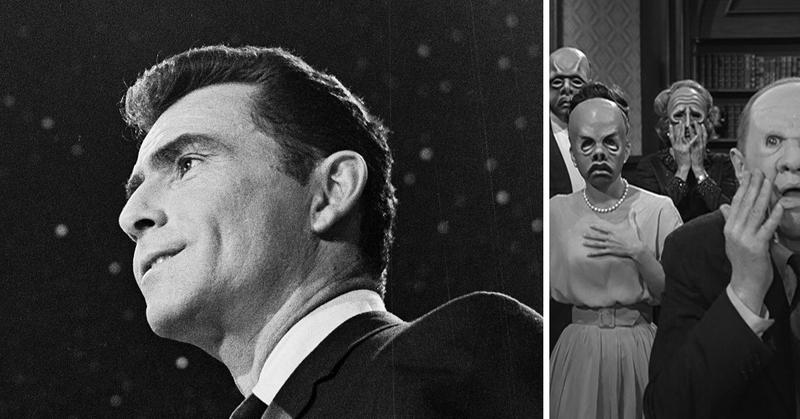Back To 'The Twilight Zone,' Where Rod Serling Made TV Into An Art Form
By | December 26, 2017

Few TV shows from the old days hold the enduring appeal of Rod Serling's The Twilight Zone. Its legacy is clear: Black Mirror. The Outer Limits. Tales From The Crypt. Tales From The Darkside. Amazing Stories. And now, 60 years since its debut, The Twilight Zone reboot by Jordan Peele -- all of these owe a debt to Rod Serling's original Twilight Zone, which aired from 1959-64. Lots of television shows of the era created worlds and characters we liked, take your pick -- maybe Dobie Gillis was the best friend you never had, or Andy Griffith was your imaginary surrogate father, or Rob and Laura Petrie's flat was your dream urban pad. We watched them because they were comfortable, not discomforting. But The Twilight Zone started almost from scratch every week -- just a familiar introduction from Rod Serling, and you were into the story, with characters you didn't know, headed down a narrative road toward a destination that was bound to be challenging or unpleasant. An anthology series is difficult to pull off, with a new cast and plot every week -- that's why, until Black Mirror, the format was all but dead.
Week to week, the only thing holding an anthology series together is the writing; if the writing maintains a level of quality then the show can go on. And few TV series before, or in the 60 years since, have been written anywhere near as well as The Twilight Zone.

The Twilight Zone, like the best episodes of Star Trek, told us something about the world we live in by isolating that thing in a world alien to us. In the late '50s and early '60s, the nation was wrestling with equality and Civil Rights, the Cold War gave us a simmering paranoia, and a differing attitudes of the young and old showed the beginnings of the Generation Gap. And those timeless old forces were always there: vanity, weakness, greed, and assorted vices and Deadly Sins.
The Twilight Zone mined all this territory, these dark corners of the mind and of society, to bring us some of the most perfectly-crafted television we've ever watched.

Rod Serling was an American screenwriter, playwright, television producer who was well known by the time The Twilight Zone premiered in 1959. He was a genius at his craft as well as having strong political interests. In Hollywood, Serling was known as the “angry young man;” often butting heads with television sponsors and executives regarding everything from censorship and racism to war.
After being involved in radio programs while in college, Serling realized that it had given him a voice and he intended to use it. Much of what he wrote and broadcast was socially controversial, and he often found himself struggling with conservative minds over scripts.

The familiar voice of the narrator of The Twilight Zone was Rod Serling’s own voice. The first season’s opening monologue went as follows:
There is a fifth dimension beyond that which is known to man. It is a dimension as vast as space and as timeless as infinity. It is the middle ground between light and shadow, between science and superstition and it lies between the pit of man's fears and the summit of his knowledge. This is the dimension of imagination. It is an area which we call the Twilight Zone.Season Two's introduction brought us the famous "signpost" phrase:
You're traveling through another dimension, a dimension not only of sight and sound but of mind. A journey into a wondrous land whose boundaries are that of imagination. That's the signpost up ahead - your next stop, the Twilight Zone!
Season Three's intro was a slightly shorter version of Season Two's. Serling spoke of a key and a door as he kicked off episodes in Seasons Four and Five:
You unlock this door with the key of imagination. Beyond it is another dimension - a dimension of sound, a dimension of sight, a dimension of mind. You're moving into a land of both shadow and substance, of things and ideas. You've just crossed over into the Twilight Zone.

Rod Serling had suggested to his audiences that there were things out there that were of another world. That idea alone terrified us, but we couldn’t look away; similar to a train wreck. After audiences got on board with the program, it took off and we couldn’t get enough.

Besides the other world he spoke of, Serling made it clear that forces of defeat are not only tangible but also included thoughts, attitudes and prejudices found in the minds of men. All of those things have the capacity to be as deadly as any weapon of mass destruction. Typically, we think of weapons as bombs and guns and other similar things. The truth is that when people allow their fears to dictate their lives, it can be just as devastating.

Rod Serling was hugely influential in shaping television standards and often pushed the proverbial envelope. He challenged his audiences to think outside of the box and to open their minds up to new things. He was truly a poster child for change. Rod Serling was a progressive thinker and introduced audiences to the fact that sometimes, "truth is stranger than fiction."
